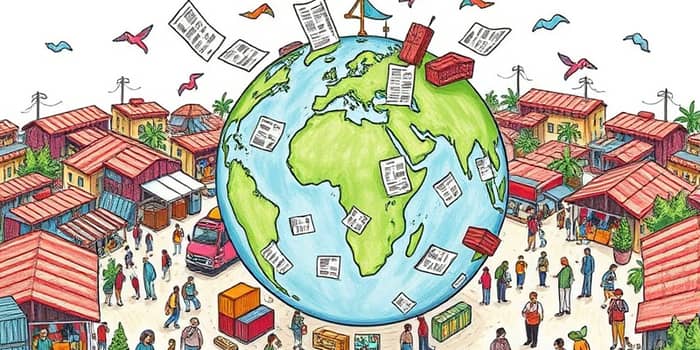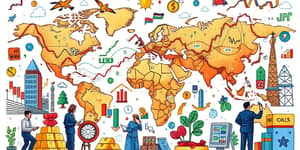Global events can shape neighborhoods, towns, and cities in profound ways. From tariff announcements to international travel advisories, headlines beyond our borders often ripple into local markets. By exploring key mechanisms and real-world examples, we can learn to navigate these forces and leverage them for better outcomes.
Understanding the Global-Local Economic Nexus
Every announcement of policy changes, trade agreements, or economic downturns abroad has the potential to sway consumer and business confidence at home. For instance, when the U.S. threatened new tariffs in 2024, Mexico’s manufacturing PMI plunged to 44.8, showing immediate impacts on local markets within days.
Similarly, global travel advisories can reshape entire industries overnight. In 2024, the travel and tourism sector contributed $10.9 trillion to global GDP, supporting 357 million jobs. A single conflict or health scare can send hotel occupancy rates tumbling in resort towns thousands of miles away.
Media Feedback Loops and Behavioral Responses
Economic news does more than report facts; it often propels action. When reports highlight rising unemployment or surges in inflation, households may tighten budgets, and investors might pull back, creating a self-fulfilling cycle. Researchers call this the “feedback loop” between coverage and outcomes.
For instance, a study in the U.S. Midwest observed that a single unemployment report drove a 2% decline in retail sales across affected counties within two weeks. Similarly, reports forecasting higher consumer prices have led to stockpiling behaviors, temporarily boosting sales of durable goods before demand normalizes.
In some cases, media stories even precede and drive market movements. Before a tariff on imported cars took effect, U.S. consumers rushed to dealerships, anticipating higher prices. This surge underscores how powerful public perception can be when amplified by global headlines.
The Digital Transformation: Speed, Reach, and Risks
The rise of digital platforms has amplified the speed and breadth of information exposure worldwide, but it also introduces new vulnerabilities. Algorithms prioritize sensational or emotionally charged stories, often at the expense of nuance. As a result, local communities may receive distorted impressions of global events.
When a leading social platform adjusted its algorithm in 2023, local investigative stories saw a 30% drop in engagement almost overnight. These shifts can erode community awareness about important economic developments, from zoning legislation to small-business grants.
Moreover, false or misleading headlines can spread rapidly, undermining trust in legitimate journalism. In 2024, several communities reported consumer confusion when erroneous reports about new federal subsidies circulated online, causing spikes in business inquiries and administrative bottlenecks.
The Erosion of Local Journalism and Economic Citizenship
Despite growing global connectivity, traditional local newsrooms have withered. Since 2000, employment in local newspapers has fallen by 80%, while digital outlets saw a 16% post-pandemic surge. This shift has left a vacuum in reporting on zoning changes, small-business openings, and community projects.
With dwindling resources for local news outlets, residents often lack the granular information needed for informed economic decision-making at home. Without trustworthy local reporting, even well-intentioned citizens may miss critical updates on policies that directly influence tax rates, school funding, or infrastructure investments.
Key Influences of Global News on the Local Economy
Harnessing Global News for Local Benefit
While risks abound, local businesses and consumers can turn global news into an advantage. By maintaining a critical perspective and seeking diverse viewpoints, communities can anticipate shifts and adapt strategies accordingly.
By integrating both global and local insights, community leaders can design more resilient economic strategies. For example, chambers of commerce may schedule quarterly briefings that analyze international policy shifts alongside local employment data, fostering informed economic decision-making at home.
Consider these practical steps to stay ahead:
- Monitor reliable international outlets alongside local journalism for diversified sources for balanced perspectives.
- Subscribe to economic newsletters or alerts for timely updates on trade policies and market trends.
- Join community forums or business associations to discuss news impacts and coordinate responses.
- Use data dashboards and local reporting to verify national headlines against real-time community indicators.
- Invest in ongoing learning about global economic forces through webinars and workshops.
Common Pitfalls and How to Avoid Them
Even savvy readers can fall into traps when processing global news. Awareness of these pitfalls helps maintain clarity and informed action.
- Overreacting to sensational headlines without context.
- Relying solely on social media snippets for complex policy changes.
- Ignoring local data that may contradict global narratives.
- Failing to verify statistics or forecast assumptions.
Awareness of these pitfalls is just the first step. Proactive verification—cross-checking statistics, consulting local experts, and contextualizing figures—turns passive readers into informed actors capable of anticipating and mitigating economic disruptions.
Looking Ahead: Building Resilient Local Economies
Global news will continue to shape local destinies, but communities that foster strong local journalism and embrace a balanced media diet stand to gain the most. Public policy can support this by incentivizing independent reporting and regulating digital platforms to ensure fair visibility for community-focused stories.
Local governments can consider matching grants or tax incentives for nonprofit newsrooms, while private foundations may establish endowments to underwrite investigative projects. At the grassroots level, residents can form media cooperatives or contribute to crowdfunding campaigns that sustain investigative journalism.
By recognizing the algorithmic prioritization of engaging content and countering it with thoughtful analysis, residents and business leaders can harness information flows for sustainable growth. In this interconnected era, knowledge truly is power.
Ultimately, the interplay between global headlines and neighborhood realities offers both challenges and opportunities. Armed with the right tools and a commitment to civic engagement, each of us can turn waves of international news into pillars of local prosperity, ensuring that economic well-being thrives from the global forum down to Main Street.
References
- https://reutersinstitute.politics.ox.ac.uk/digital-news-report/2024/dnr-executive-summary
- https://www.econ.iastate.edu/ask-an-economist/what-impact-local-news-local-economy
- https://www2.deloitte.com/us/en/insights/economy/global-economic-outlook/weekly-update.html
- https://www.oecd.org/en/topics/sub-issues/regions-cities-and-local-statistics.html
- https://wttc.org/research/economic-impact
- https://academic.oup.com/ooec/article/doi/10.1093/ooec/odae040/7925798
- https://www.imf.org/external/np/exr/ib/2008/053008.htm










